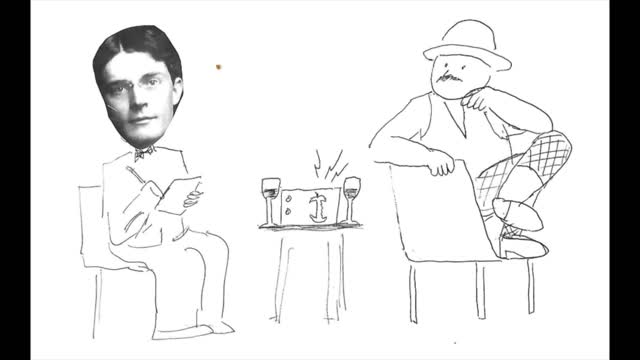Premium Only Content

Anxiety Disorder Therapist
“Anxiety Disorder Therapist” Notes:
A therapy session with John B. Watson, behaviorist psychologist. Inspired by the “Little Albert” classical conditioning experiment conducted by Dr. John Watson (1878-1958) and his graduate student, Rosalie Rayner (1898-1935) in 1920. Also inspired by John Kander and Fred Ebb's 1966 musical "Cabaret.” The skit also pokes fun at the large-scale production, assembly line-oriented "comedy" skit factories.
Dr. Watson: “Ah, Mr. Little. Welcome, so happy to see you.” Refers to the “Wilkommen” number from “Cabaret” (Act 1, Scene 1).
Dr. Watson: “My wife Rosie , the kids and I had two fluffy buttermilk pancakes, two eggs sunny side up, two slices of crispy turkey bacon strips, a side order of buttered wheat toast with the crusts removed, orange juice and coffee this morning, and reviewed your case as part of this balanced breakfast.”
Albert: “Um…Rosie? Rosalie Rayner? Isn’t that your grad student?”
Dr. Watson: “Yes that’s right.”
Rosalie Rayner became Dr. Watson’s second wife in 1920 after a bitter public divorce from his first wife, Mary Ickes.
Albert: “Well, I think I’m just fine. When I’m at home anyway. I live by myself. Then one day at work my friends invited me out for drinks. ‘What good is sitting alone in your room?’ they said. ‘Come hear the music play,’ they said. ‘Life is a cabaret, old chum, come to the cabaret,’ they said.” - The first lines from the song “Cabaret” (Act 2, Scene 5).
Albert: “Well like I said I live alone; no wife, fiancé or girlfriend. No love interest to speak of. And without love I am nothing.” - Refers to “Without Love (There is Nothing).” Written by Danny Small and originally recorded by Clyde McPhatter in 1957, it was made most famous by Tom Jones in 1969.
Dr. Watson: “Who says so?”
Albert: “Tom Jones says so. So does the Bible.”
Dr. Watson: “I’ve read Tom Jones, but who’s the Bible?”
Albert: “Oh that’s right, I forgot you’re a feminist.”
Dr. Watson here is mistaking Tom Jones, the pop singer with “Tom Jones," the novel, i.e., “The History of Tom Jones, A Foundling” by Henry Fielding (1749).
Dr. Watson: “Well Rosie and I wouldn’t know about love; we don’t allow weapons in the house.”
Refers to a quote from John Watson’s 1928 book “Psychological Care of Infant and Child”:
“When you are tempted to pet your child remember that mother love is a dangerous instrument. An instrument which may inflict a never-healing wound, a wound which may make infancy unhappy, adolescence a nightmare, an instrument which may wreck your adult son or daughter’s vocational future and their chances for marital happiness.”
While the book sold well in its initial release (over 100,000 copies in only a few months), Dr. Watson’s approach to parenting isn’t widely accepted today.
Dr. Watson: “Yes. Specifically the technique of systematic desensitization.” - “Little Albert” was removed from the lab before he could be deconditioned by Dr. Watson. Dr. Watson and Dr. Mary Cover Jones discovered in another infant (“Peter”) that infants could be deconditioned from fears as well. This behavior modification therapy was later formally developed into systematic desensitization by South African psychiatrist Joseph Wolpe (1915-1997).
Dr. Watson: “Yes. You see, Albert, your phobia did not happen instantly; it built up gradually over time, probably starting with the pairing of the sight of a woman with the cacophonous, bone-jarring sound of what sounds like someone striking a steel bar with a hammer behind the back of your head.“ - Little Albert was classically conditioned to fear rats when Dr. Watson paired the sight of a rat to an unpleasant sound (striking a steel bar with a hammer).
Very grainy voiceover: “AAAAP!!! AAAAP!!! AAAAP!!! EEEEEEE!!!” – A spoof of the emergency alert system signal. For more on the history behind this peculiar noise, see the “Who Decided That?” link below.
Very Grainy Voiceover: “Conditions are favorable for further plot developments including unpredictable turning points, a deteriorating dating history that can result in sudden bursts of “Ouch”-worthy politically incorrect and misogynist statements, and blustery theory-pushing therapists ranting at speeds of up to 250 words per minute.” - A spoof of the (in our opinion overreaching and overzealous) Chicago Theatre Standards. “Ouch” is referring to the “Oops” and “Ouch” approach they use for handling “hurtful” remarks or actions in the theatre. “Ouch” meaning someone has taken offense, and “Oops” meaning an apology.
Albert: “The dancer who left me for a half a man...and left me with an 800 dollar tab…and all she ever had was bread…” – Refers to the number “Two Ladies” from “Cabaret”(Act 1, Scene 7).
Albert: “…AND who started making out with the 50 percent off slack rack before I even walked out the department store. Damn that Lacy. Running around with pants half off....” Refers to “Don’t Tell Mama” (Act 1, Scene 4):
“Mama thinks I’m living in a convent,
A secluded little convent
In the southern part of France
Mama doesn’t even have an inkling
That I’m working in a nightclub
In a pair of lacy pants.”
Dr. Watson: “Maybe we shouldn’t use rats from your past. How about I make up a name? How about, oh, I don’t know...how about Fritzie?” - In Act 1, Scene 3, a sailor refers to Fraulein Kost, the prostitute, as “Fritzie.”
Albert: “Yes, Fritzie. Fraulein Fritzie Kost. You know, I thought she was a defense contractor when she said she worked for the Navy. Fritzie was a no show…I thought I struck out. Then she saw me the next day, sobbing and crying, begging for forgiveness, wanting to go out that evening. I said yes….but that night, she was a no-show again. Turns out I wasn’t at bat, I was the pitcher who gave up a stand up double…” - Baseball euphemisms as they pertain to dating tend to have a “positive” correlation with one another: A “strikeout,” for instance, is a bad thing both in baseball and dating, “first base,” is good in both and “home run” is even better in both. A stand-up double is what we call an inverse baseball euphemism. A stand up double in baseball is actually a good thing, but as we see here, a very bad thing in the realm of dating.
Albert: “I heard Fritzie shout loudly in the background at the top of her lungs that she wasn’t in... Looks like mighty Albert indeed struck out…” A reference to Cliff from Cabaret, who quoted “Casey at the Bat.”
Albert: “Maxine was Max, the sleazy cabernet owner before he was released from the 40 man night club roster, designated for sexual reassignment and claimed off waivers as Fritzie’s madam.” – Yet another play on a baseball euphemism, this one is a play on the “Designated for Assignment” rule in Major League Baseball.
References:
Kander, J. and Ebb. F. (1998). Cabaret. First published in 1966. From the book by Joe Masteroff. http://www.roundlaketheatre.com/uploads/4/2/7/5/42757847/cabaret_1998_libretto_with_translations.pdf
Major League Baseball. https://www.mlb.com/glossary/transactions/designate-for-assignment
Watson. J.B. (1928). Psychological Care of Infant and Child. George Allan and Unwin, Ltd. https://archive.org/details/dli.ernet.7917/page/n5/mode/2up
Wikipedia. John Watson. https://en.wikipedia.org/wiki/John_B._Watson
Wikipedia. Little Albert experiment. https://en.wikipedia.org/wiki/Little_Albert_experiment
Wikipedia. Systematic desensitization. https://en.wikipedia.org/wiki/Systematic_desensitization
YouTube. Who Decided That? https://www.youtube.com/watch?v=C7h1JNeS3uk
-
 LIVE
LIVE
RG_GerkClan
2 hours ago🔴LIVE - I'm Back from Vacation...Lets Dominate - Gray Zone Warfare - Gerk Clan
102 watching -
 48:28
48:28
SB Mowing
8 days agoI Took a RISK Cleaning This Yard and Could’ve Ended Up in the Hospital
8.29K36 -
 LIVE
LIVE
Shield_PR_Gaming
1 hour agoGrazy Zone Warfare Solo Missions are a pain in the butt Part 2!
27 watching -
 8:04
8:04
WhaddoYouMeme
18 hours ago $4.03 earnedThe REAL Truth Behind Bieber's 'Mental Breakdown' Post
86.4K13 -
 LIVE
LIVE
MrR4ger
3 hours agoMIDNIGHT R4GE - TEAMWORK MAKES THE DREAM WORK / SOCT, PEAK, GEARS, ETC?
41 watching -
 LIVE
LIVE
CassaiyanGaming
1 hour agoHogwarts Legacy | Saturday at 8:10am central
69 watching -
 5:57:53
5:57:53
MyronGainesX
11 hours ago $14.82 earnedScott Horton EMBARRASSES Emily Austin! Iran Israel War Day 8 Analysis!
49.2K24 -
 9:02
9:02
MattMorseTV
20 hours ago $8.00 earnedTrump's DHS just CRACKED DOWN.
61.8K89 -
 8:53
8:53
Bearing
1 day agoJD Vance BREAKS BlueSky: Most BLOCKED Man Ever! 😂
37.2K107 -
 LIVE
LIVE
TheBeardedNerdd
1 day ago🔴 LIVE - 24- hours stars now ( !24hr )
157 watching